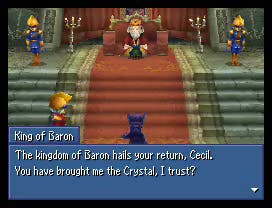Final Fantasy IV
Chocobo selector.
The Final Fantasy series polarises gamers like no other. Believers defend its shortcomings, idiosyncrasies and cynical spin-offs with blind fury while detractors are only too eager to dismiss the entire mythology off-hand. Final Fantasy, as an idea, can do no wrong to those blinded by fond memories of younger days spent dreaming in Midgar or doodling pictures of Aerith, Squall or Tidus just as it can do no right to those who won't see past the random battles, overblown dialogue and kindergarten philosophy.
The problem with these black and white opinions is that they leave no room for nuance and subtlety, those shades of grey in which truth is so often painted. Because, within the Final Fantasy series, quality and ingenuity vary greatly, even when the games appear very similar. Nowhere is this more apparent than when comparing this update of Final Fantasy IV to last year's overhaul of Final Fantasy III.
Both games, developed by Matrix Software, are aesthetically identical. They employ the same fonts, menu screens, squat polygonal characters, washed-out colour palette and world textures as one another; both games reinterpret their source matter in very similar ways and yet, by way of some subtle tweaks and balances, and the benefit of stronger source material, this Final Fantasy manages to be a marked improvement over the previous one in almost every way.
Chief among these improvements is the story itself. Eschewing the stock JRPG zero-to-hero narrative arc, Final Fantasy IV instead focuses on the upper echelons of a medieval-style royal courtroom. You play as a powerful knight, Cecil Harvey, who dares to question the ethics of his beloved king. For this impudence Cecil is thrown out of the courtroom and sent on a final assignment to mark the end of his royal service. Unbeknownst to Cecil, the king's order is a suicide-bombing mission that will result in the deaths of many innocent villagers.

Within the first half an hour of play the stage has been charged with a kind of hot tragedy that's unusual to videogames. Rare themes of revenge, loyalty, power and responsibility are investigated and, while this certainly isn't Tolstoy (let's remember, you can summon a fat yellow chicken to help out whenever the going gets tough) it's a story of surprising pace and range, something that will help drive today's players through some of the more archaic game elements.
As with last year's update of Final Fantasy III, this is a difficult and unforgiving game but, thanks to a deeper battle system and some better balancing, its enlivened by the challenge rather than ruined by it. It's not unusual to venture out from the safety of a town into a dark cavern only to run out of healing potions, your whole party wiped out 20 minutes later, with no option but to reload back at the town again. Released 17 years ago, the Japanese original was deemed so tough that Squaresoft created a bespoke 'Easy Type' version for the American release. No such concessions are made to lily-livered Westerners today and this DS version is the full strength original.








